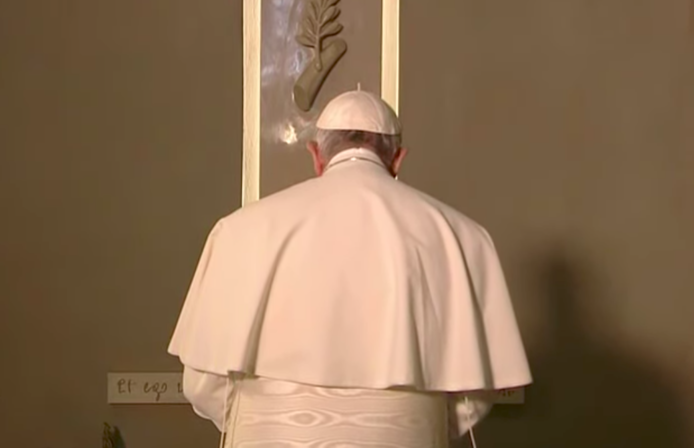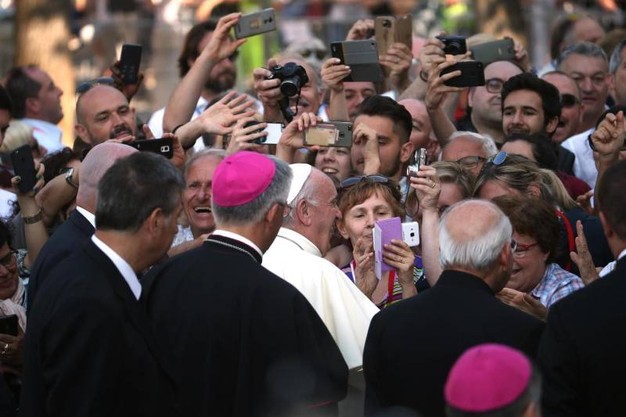On June 20, Pope Francis prayed at the tomb of don Primo Mazzolari and don Lorenzo Milani, two of the Italian priests who, throughout their lives, endured harassment and humiliation by their own church for their very advanced and progressive positions on pacifism, ecumenism, and social equality. For 27 years, Don Primo Mazzolari was the archpriest of Bozzolo, the town of our columnist Stefano Albertini. Born shortly after the death of don Mazzolari, Stefano, whose parents instilled in him the teachings of Mazzolari and who himself studied Mazzolari’s works, published his first book in 1988, Don Primo Mazzolari e il fascismo, 1921-1942.

Although the Pope’s visit was strictly a private, if not spiritual and ecclesiastical, affair – the Pope himself didn’t want an official reception – we can’t forget that Father Primo was not only a priest, but also a citizen and politician (in the noble and Aristotelian sense of the word). Precisely because he was Christian, Father Primo felt the need to be a citizen and to actively participate in the life of the “polis”— his city and country, being Bozzolo and all of Italy.
Giorgio Campanini, perhaps the most famous scholar on Mazzolari the politician, rightfully pointed out how his relationship with politics always entailed his being a political opponent. Of course, the opposition varied according to the political movements he experienced and the historical periods during which he lived: frontal opposition and without reservation to Fascism, ideological opposition, but socially open to Marxism, and what can be defined as an inner opposition even towards the neoconservative and clerical temptations by the Christian Democratic Party.
Father Mazzolari was a strong and vehement opponent of Fascism from the beginning, when he saw and condemned early Fascist groups and violence in the countryside between Mantua and Cremona. As a young priest, he was a democratic interventionist – just like Mussolini and Salvemini, to name the polar opposites of the same movement – who believed that the Great War War was a missed opportunity for the proletariat to achieve social and economic redemption. Because of his position and service, first as a soldier and then as an official and military chaplain in the Italian army, he gained respect in the field. He also achieved recognition and had hoped of support, albeit external, from the local Fascists. But they really underestimated that priest who in Bozzolo and Cicognara wouldn’t pass up any chance to distance himself from them and their deceptive use of veterans. This is the same priest who each 4th of November, invited them to make long-lasting peace instead of inviting them to commemorate the victory of the Great War.
Not even after the 1929 Treaty of Conciliation between Italy and the Vatican, which put an end to the “Roman Question,” and which was welcomed by chancelleries all over the world as Mussolini’s diplomatic masterpiece, would Father Primo change his mind. “From absolute and reactionary powers – about which he wrote to his friend Guido Astori – the Church earned not but humiliation and restriction of freedom and…terrible shared responsibilities towards tired and miserable people.” The regime, which deemed Mazzolari a threat, monitored him closely. He was the target of an intimidating attack by the Militia, he was monitored by the secret police, and his 1942, Tempo di credere (Time to Believe) ended up under the axe of Fascist censorship. Only the protection of his bishop, Monsignor Cazzani, and the vast love of his people, safeguarded Father Primo from worse reprisal.

During the Resistance, Mazzolari was a moral guide and a logistical resource for the Partisans of the area, and he ended up precisely in thethe crosshairs of the Nazi-Fascists who, after arresting him and freeing him, issued a new arrest warrant, forcing him to go into hiding until Italy was liberated. During the final and most dramatic years of the war, don Primo facilitated his escape and ensured the safety of Jews and drifters. But above all, he committed to laying foundations for the future. Despite the difficulties and the surveillance to which he was subjected (by both the regime and the Church), his preaching spread from associations of Catholic academics, where he would go while the anguished cutouts of freedom slipped from Fascists control. There, he would forge the future along with the new Republican Catholic ruling class, with whom Mazzolari continued to maintain an intensive dialogue and exchanges that were incredibly influential, especially during the process of developing the constitution of the new Republic.
In the postwar reconstruction period, don Primo, enthusiastic about his newly found freedom, decided to decisively embark on the political debate. The Church seemed to have eased the offensive and humiliating surveillance imposed by the Holy Office, as the priest of Bozzolo, who was anti-Fascist and a friend of the Partisans, was one of the few priest that had no kind of connivance with the past regime. Father Primo would fill the town square with his speeches and memorable oppositions in which he would support Catholic-Democratic candidates and warn about the inevitable totalitarian drift of Communism. At the same time, however, he would remind Christians that Communism “today is, above all, a rebellious ‘state of mind’ against any kind of social evil, an inner period of advent” (1945).

But don Mazzolari’s greatest political miracle, which will not count towards his beatification given its secular and civil nature, was that despite his passionate participation in political life during troubled times, he never lost sight of the essence of man. As he says in a sermon on Epiphany Day in 1958: “God doesn’t care about our skin color, language or religion, if we live on the equator or at the Pole, […] he looks only at the Man.” This could easily be a quote from one of the most recent speeches of Pope Francis to the Diplomatic Corps accredited to the Holy See or to the great powers of the Earth. But in reality, it was first spoken by a poor country priest almost 70 years ago in front of his peasant parishioners.
Translation by Giulia Casati












